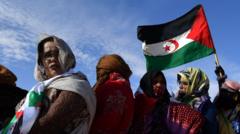France's endorsement of Moroccan rule over Western Sahara highlights shifting geopolitics in North Africa, sparking reactions from Algeria and the Polisario Front.
France Supports Moroccan Sovereignty Over Western Sahara Amid Controversy

France Supports Moroccan Sovereignty Over Western Sahara Amid Controversy
Emmanuel Macron’s remarks on Western Sahara signal a shift in France’s foreign policy stance, igniting tensions with Algeria.
France's President Emmanuel Macron has declared that he supports Moroccan sovereignty over Western Sahara during his address to Morocco's parliament, asserting a commitment to invest French funds in the region. This statement comes as part of a wider context regarding the long-standing territorial conflict over Western Sahara, which is situated on Africa's north-western coast. Historically a Spanish colony, the area is now largely under Moroccan control, while the Algerian-backed Polisario Front claims to represent the indigenous Sahrawi people, advocating for their right to establish an independent state.
Macron's assertion aligns France with several other nations, including Spain, Poland, and the United States, which have expressed support for Morocco’s sovereignty claim. His remarks prompted applause from Moroccan lawmakers, marking a notable shift in France's policy regarding the disputed territory. He described Morocco's proposed autonomy initiative as "the only basis" for a lasting political resolution and reiterated France's recognition of Morocco's claim to the region, echoing similar remarks made by him in July.
This newfound endorsement has angered Algeria, which views Morocco's governance over Western Sahara as an illegal occupation, leading to the withdrawal of its ambassador to Paris. Analysts interpret France’s decision as a move to mend relations with Morocco, especially after tensions flared over allegations of Moroccan espionage and tightened visa regulations for Moroccan visitors to France.
During his visit to Morocco, Macron acknowledged the complexities of colonial history without issuing a formal apology. "There were times of colonial ambition and violence, and even Morocco could not escape those dynamics," he said, recognizing the dual legacy of France’s historical involvement in North Africa.
The state visit has also facilitated agreements on various sectors, including energy and infrastructure, valued at approximately €10 billion. Macron has promised further investments and support initiatives for the local populace in Western Sahara, aiming to bolster ties between France and Morocco.
Despite France's overtures toward Morocco, the situation remains tense. Algeria has condemned the support for Morocco's claims as a denial of the Sahrawi people's right to self-determination. The Polisario Front has criticized France for endorsing what it claims to be Morocco's illegal rule over the Sahara, following the region's annexation by Morocco in the mid-1970s. A 16-year insurgency ended with a ceasefire in 1991, which included promises for a referendum on independence — a process that has been stalled due to ongoing disputes over its execution. Currently, the African Union stands as the sole international entity that recognizes Western Sahara as a sovereign state.
Macron's assertion aligns France with several other nations, including Spain, Poland, and the United States, which have expressed support for Morocco’s sovereignty claim. His remarks prompted applause from Moroccan lawmakers, marking a notable shift in France's policy regarding the disputed territory. He described Morocco's proposed autonomy initiative as "the only basis" for a lasting political resolution and reiterated France's recognition of Morocco's claim to the region, echoing similar remarks made by him in July.
This newfound endorsement has angered Algeria, which views Morocco's governance over Western Sahara as an illegal occupation, leading to the withdrawal of its ambassador to Paris. Analysts interpret France’s decision as a move to mend relations with Morocco, especially after tensions flared over allegations of Moroccan espionage and tightened visa regulations for Moroccan visitors to France.
During his visit to Morocco, Macron acknowledged the complexities of colonial history without issuing a formal apology. "There were times of colonial ambition and violence, and even Morocco could not escape those dynamics," he said, recognizing the dual legacy of France’s historical involvement in North Africa.
The state visit has also facilitated agreements on various sectors, including energy and infrastructure, valued at approximately €10 billion. Macron has promised further investments and support initiatives for the local populace in Western Sahara, aiming to bolster ties between France and Morocco.
Despite France's overtures toward Morocco, the situation remains tense. Algeria has condemned the support for Morocco's claims as a denial of the Sahrawi people's right to self-determination. The Polisario Front has criticized France for endorsing what it claims to be Morocco's illegal rule over the Sahara, following the region's annexation by Morocco in the mid-1970s. A 16-year insurgency ended with a ceasefire in 1991, which included promises for a referendum on independence — a process that has been stalled due to ongoing disputes over its execution. Currently, the African Union stands as the sole international entity that recognizes Western Sahara as a sovereign state.





















